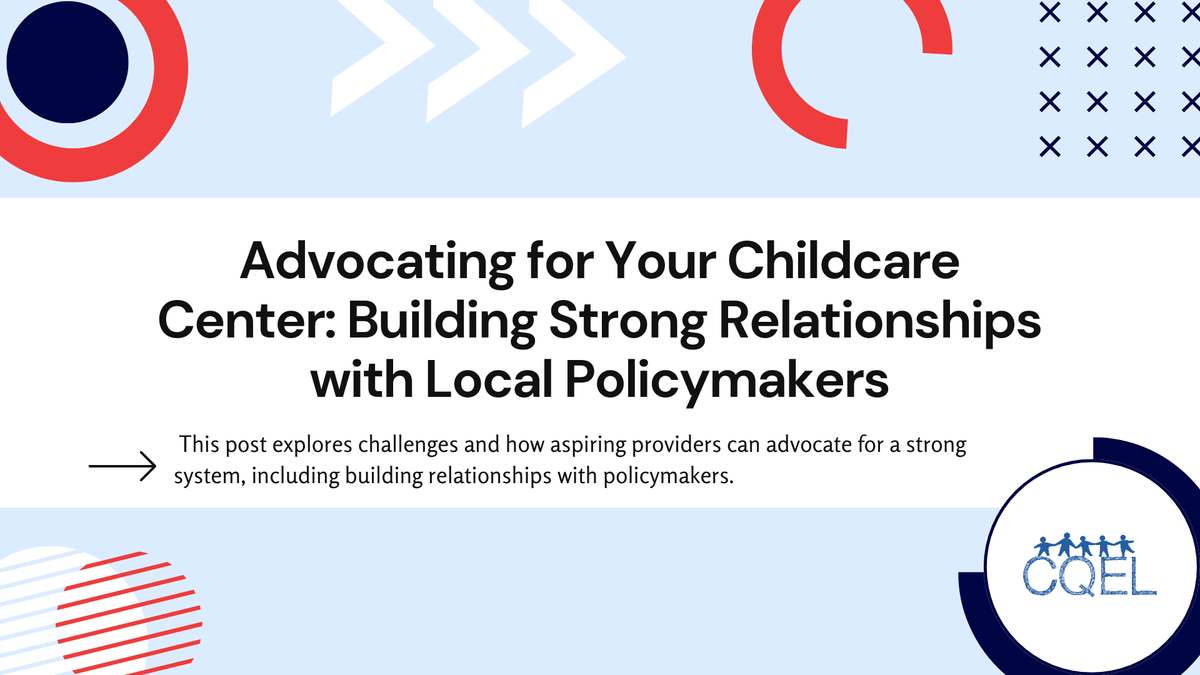Advocating for Your Childcare Center: Building Strong Relationships with Local Policymakers
Become a Champion for California's Childcare System! High-quality childcare benefits children, families, and the economy. This post explores challenges and how aspiring providers can advocate for a strong system, including building relationships with policymakers.

California's childcare system plays a vital role in the well-being of children and the state's economic engine. High-quality childcare allows parents to enter the workforce with peace of mind, knowing their children are safe and nurtured. However, the system faces challenges, including affordability for families and a shortage of qualified childcare providers. As an aspiring childcare provider in California, advocating for a thriving childcare system is not just an option, it's a necessity. Building strong relationships with local policymakers is a crucial step in achieving this goal.
Understanding the landscape of local government is essential. Policymakers at the city and county level, such as mayors, city council members, and county supervisors, have a significant influence on issues impacting childcare. They play a key role in allocating resources and shaping policies that affect childcare providers and families. The policymaking process typically involves agenda setting, where issues are prioritized for discussion, followed by deliberation, voting, and finally, implementation. Familiarizing yourself with your local government structure and policymaking process empowers you to participate effectively (resources like the League of Women Voters website: [https://lwvc.org/] can be helpful).
The first step is identifying your local representatives. City and county websites often provide this information, or you can utilize resources like the League of Women Voters to find contact details. Establishing communication with policymakers before a crisis arises allows you to build trust and rapport. Attend town halls or community meetings to voice your concerns and perspectives. Consider writing letters or emails highlighting the challenges you face and the impact on the families you serve.
Effective communication is key. Don't just present problems; focus on the solutions. Policymakers are more likely to champion policies they understand will have a positive impact. Frame your message around the benefits of a robust childcare system for all stakeholders. Data and local stories can be powerful tools. Highlight how access to affordable, high-quality childcare benefits children's development, allows parents to work, and contributes to the overall economic health of the community.
Remember, collaboration is key. Partner with other childcare providers in your area, parent groups, and advocacy organizations like the California Child Care Resource & Referral Network ([https://rrnetwork.org/]) A united voice carries more weight than individual ones.
Developing a clear and concise message is crucial. Policymakers are busy, so focus on the main points. Emphasize the benefits of a thriving childcare system, not just the challenges. Don't just identify problems; propose solutions or advocate for existing initiatives that support childcare providers, such as grant programs or training opportunities.
Stay informed and engaged. Resources like the National Child Care Advocacy Council (https://www.nclcca.org/Advocacy-Council) provide updates on relevant legislation and policy proposals. Track local legislative agendas and attend meetings where decisions impacting childcare are made. Your voice matters, and your active participation can shape the future of California's childcare system.
Building strong relationships with policymakers is an ongoing process. By following these steps, you can become a champion for children, families, and a sustainable childcare system in California. Remember, your dedication to providing high-quality care, coupled with your advocacy efforts, can make a significant difference in the lives of countless children and families.
